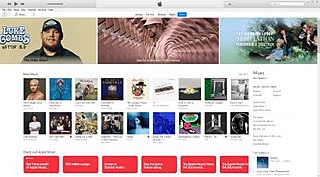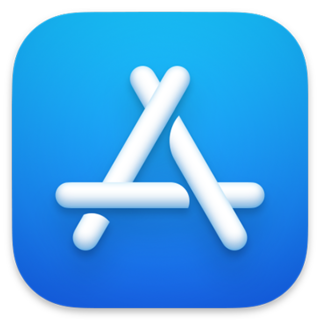This article needs additional citations for verification .(January 2009) |
Type of site | Music downloads |
|---|---|
| URL | www |
| Launched | July 2003 |
BuyMusic was a paid online music store run by Buy.com.
This article needs additional citations for verification .(January 2009) |
Type of site | Music downloads |
|---|---|
| URL | www |
| Launched | July 2003 |
BuyMusic was a paid online music store run by Buy.com.
The store was launched in July 2003 with 300,000 tracks available [1] and was designed to compete with iTunes Music Store because at the time of launch, Apple's store was limited to Macintosh users, and BuyMusic was the first to offer paid downloads to non-Mac users. Unlike iTunes Music Store, the price of each song ranges from 80¢ to US$1.99. Reportedly in 2003, the site claimed to be "The World’s Largest Download Music Store."
The site used to have extreme limitations on what users could browse. It would not allow anyone not using Microsoft Windows and Internet Explorer 5.0 or greater to even view the songs available. Even users that met the stated requirements could encounter trouble—clicking the main "click here" link routinely crashed some user's IE 5.5 browsers. Before the spring 2004 integration with its parent site, Buy.com, [2] users that did not meet the stated requirements couldn't even access static content such as press releases. Since the integration, all users can access all of Buy.com.
The site has provided no statistics regarding the number of customers and downloads, yet Scott Blum, founder and CEO of BuyMusic, noted "We're nowhere near Apple's iTunes Music Store numbers." in a December 2003 interview.
Though the download service's closure was never officially announced, it had quietly disappeared by December 2009, if not before; [3] Buy.com's press releases stopped mentioning it sometime in 2007. The buymusic.com URL formerly redirected to Buy.com's physical CD store, and later redirects to Rakuten but now times out.

Jon Lech Johansen, also known as DVD Jon, is a Norwegian programmer who has worked on reverse engineering data formats. He wrote the DeCSS software, which decodes the Content Scramble System used for DVD licensing enforcement. Johansen is a self-trained software engineer, who quit high school during his first year to spend more time with the DeCSS case. He moved to the United States and worked as a software engineer from October 2005 until November 2006. He then moved to Norway but moved back to the United States in June 2007.

iTunes is a software program that acts as a media player, media library, mobile device management utility, and the client app for the iTunes Store. Developed by Apple Inc., it is used to purchase, play, download, and organize digital multimedia, on personal computers running the macOS and Windows operating systems, and can be used to rip songs from CDs, as well as play content with the use of dynamic, smart playlists. Options for sound optimizations exist, as well as ways to wirelessly share the iTunes library.

The iTunes Store is a digital media store operated by Apple Inc. It opened on April 28, 2003, as a result of Steve Jobs' push to open a digital marketplace for music. As of April 2020, iTunes offered 60 million songs, 2.2 million apps, 25,000 TV shows, and 65,000 films. When it opened, it was the only legal digital catalog of music to offer songs from all five major record labels.

Bonjour is Apple's implementation of zero-configuration networking (zeroconf), a group of technologies that includes service discovery, address assignment, and hostname resolution. Bonjour locates devices such as printers, other computers, and the services that those devices offer on a local network using multicast Domain Name System (mDNS) service records.

iLife is a discontinued software suite for macOS and iOS developed by Apple Inc. It consists of various programs for media creation, organization, editing and publishing. At various times, it included: iTunes, iMovie, iPhoto, iDVD, iWeb, and GarageBand. Only iMovie and GarageBand remain and are now freely available on Apple's Mac App Store. iDVD and iWeb have been discontinued while iTunes and iPhoto have been succeeded by Music and Photos respectively.
Inline linking is the use of a linked object, often an image, on one site by a web page belonging to a second site. One site is said to have an inline link to the other site where the object is located [REMOVE LINK]

A digital music store is a business that sells digital audio files of music recordings over the Internet. Customers gain ownership of a license to use the files, in contrast to a music streaming service, where they listen to recordings without gaining ownership. Customers pay either for each recording or on a subscription basis. Online music stores generally also offer partial streaming previews of songs, with some songs even available for full length listening. They typically show a picture of the album art or of the performer or band for each song. Some online music stores also sell recorded speech files, such as podcasts, and video files of movies.
Google Toolbar was a web browser toolbar for Internet Explorer, developed by Google. It was first released in 2000 for Internet Explorer 5. Google Toolbar was also distributed as a Mozilla plug-in for Firefox from September 2005 to June 2011. On December 12, 2021, the software was no longer available for download, and the website now redirects to a support page.

AVG AntiVirus is a line of antivirus software developed by AVG Technologies, a subsidiary of Avast, a part of Gen Digital. It is available for Windows, macOS and Android.
Digital music stores sell copies of digital audio, for example in MP3 and WAV file formats. Unlike music streaming services, which typically charge a monthly subscription fee to stream digital audio, digital music stores download songs to the customer's hard disk drive of their device. The customer will have the copy of the song permanently on their disk, provided the track is not deleted by the customer, the disk does not get physically damaged, or suffers from being corrupted. Major examples of digital music stores include iTunes Store, Amazon Music, Bandcamp and 7digital.
Amazon Music is a music streaming platform and online music store operated by Amazon. Launched in public beta on September 25, 2007, in January 2008 it became the first music store to sell music without digital rights management (DRM) from the four major music labels, as well as many independents. All tracks were originally sold in 256 kilobits-per-second variable bitrate MP3 format without per-customer watermarking or DRM; however, some tracks are now watermarked. Licensing agreements with recording companies restrict the countries in which the music can be sold.
Shazam is an application that can identify music, movies, advertising, and television shows, based on a short sample played and using the microphone on the device. It was created by London-based Shazam Entertainment, and has been owned by Apple Inc. since 2018. The software is available for Android, macOS, iOS, Wear OS, watchOS and as a Google Chrome extension.
MobileMe is a discontinued subscription-based collection of online services and software offered by Apple Inc. All services were gradually transitioned to and eventually replaced by the free iCloud, and MobileMe ceased on June 30, 2012, with transfers to iCloud being available until July 31, 2012, or data being available for download until that date, when the site finally closed completely. On that date all data was deleted, and email addresses of accounts not transferred to iCloud were marked as unused.

UC Browser is a web browser developed by mobile internet company UCWeb, a subsidiary of the Alibaba Group. It was the most popular mobile browser in India and Indonesia, and the second most popular one in China as of 2017. Its world-wide browser share as of May 2022 is 0.86% overall according to StatCounter.

Malvertising is the use of online advertising to spread malware. It typically involves injecting malicious or malware-laden advertisements into legitimate online advertising networks and webpages. Because advertising content can be inserted into high-profile and reputable websites, malvertising provides malefactors an opportunity to push their attacks to web users who might not otherwise see the ads, due to firewalls, more safety precautions, or the like. Malvertising is "attractive to attackers because they 'can be easily spread across a large number of legitimate websites without directly compromising those websites'."

The App Store is a digital distribution platform for macOS apps, often referred to as Mac apps, created and maintained by Apple Inc. The platform was announced on October 20, 2010, at Apple's "Back to the Mac" event. Apple began accepting app submissions from registered developers on November 3, 2010, in preparation for its launch.

iCloud is a cloud service developed by Apple Inc. Launched on October 12, 2011, iCloud enables users to store and sync data across devices, including Apple Mail, Apple Calendar, Apple Photos, Apple Notes, contacts, settings, backups, and files, to collaborate with other users, and track assets through Find My. It is built into iOS, iPadOS, watchOS, tvOS and macOS and may additionally be accessed through a limited web interface and Windows application.
An app store is a type of digital distribution platform for computer software called applications, often in a mobile context. Apps provide a specific set of functions which, by definition, do not include the running of the computer itself. Complex software designed for use on a personal computer, for example, may have a related app designed for use on a mobile device. Today apps are normally designed to run on a specific operating system—such as the contemporary iOS, macOS, Windows, Linux or Android—but in the past mobile carriers had their own portals for apps and related media content.

Yandex Browser is a freeware web browser developed by the Russian technology corporation Yandex that uses the Blink web browser engine and is based on the Chromium open source project. The browser checks webpage security with the Yandex security system and checks downloaded files with Kaspersky Anti-Virus. The browser also uses Opera Software's Turbo technology to speed web browsing on slow connections.

Torch was a Chromium-based web browser and Internet suite developed by the North Carolina based Torch Media. As of November 2022, downloads for Torch are no longer available, and upon clicking the download button, users are redirected to the Torch Search extension on the Chrome Web Store.
{{cite web}}: CS1 maint: archived copy as title (link)